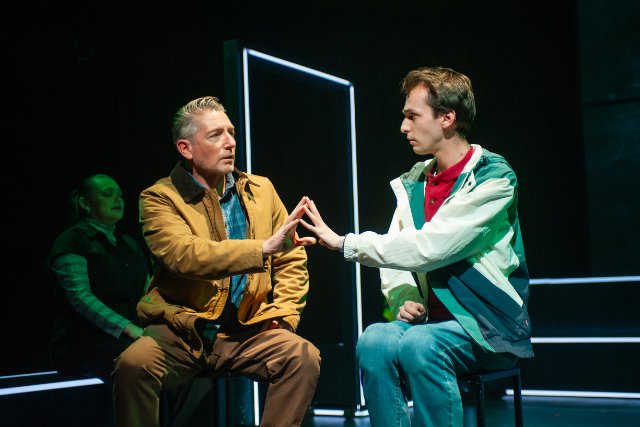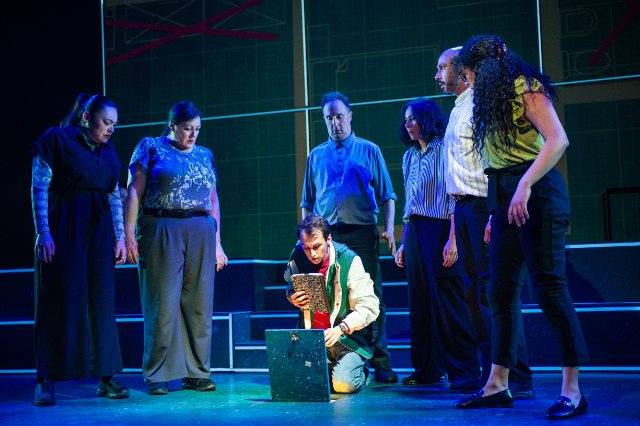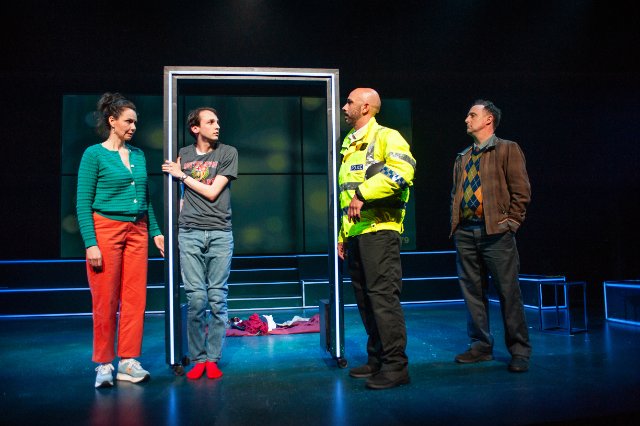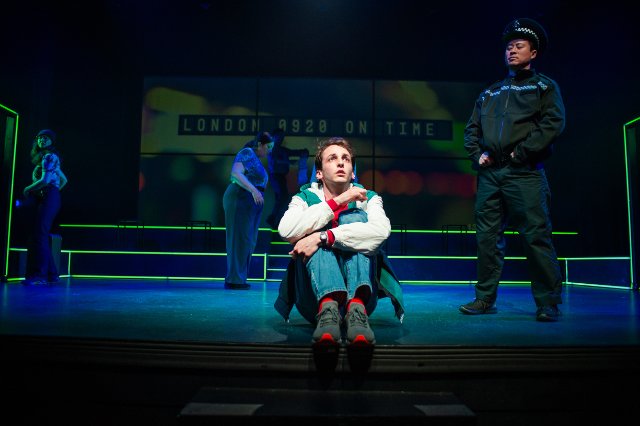The Curious Incident of the Dog in the Night-Time
Seeing the World Through the Eyes of an Autistic
By: Victor Cordell - May 17, 2025
The corpse of a dog appears - tines of a pitchfork embedded in its side and handle vertical to the sky. Such is the “The Curious Incident of the Dog in the Night-Time.”
A young boy, intent on finding out who was responsible for the killing and why, clumsily and abruptly questions neighbors to little avail. The boy, fifteen-year-old Christopher, can rattle off sequences of prime numbers and squares of numbers. He also stumbles socially; shies from being touched; and refuses to use a toilet that hasn’t just been cleaned. He is autistic.
The play’s storyline and its structure offer fascinating originality, and San Francisco Playhouse’s production, potently helmed by Director Susi Damilano, captures every bit of uniqueness in the script with a stunning, well-coordinated creative design.
The plot first concerns Christopher’s quest to solve the dog’s killing. Eventually, the perpetrator admits to the killing, but in one of the less satisfying aspects of the story, the action lacks a direct motive. The other plot thread deals with the boy’s family. During the narrative, he is told of his mother’s death from a heart attack, but his investigation into the dog’s death leads his seeking to learn more about his mother’s demise.
In a broader sense, however, the play goes beyond the plot and dives deeply into the world of autism. Brendan Looney’s powerfully illuminating Christopher is more than a simple role portrayal, since he brings authenticity as a real-life autistic, logical but regimented and repetitive. His depiction is deep and memorable. He elicits sympathy with his inability to grasp social conventions, like the natural aversion others would have to his pet rat, and his difficulty interpreting others’ intentions and facial expressions. But beyond its anchor in autism, the play is really about all outsiders who are treated with indifference or scorn by established society.
In Curious Incident… we see the world from the perspective of the autistic who wants acceptance and understanding while not conforming with neurotypical standards. We learn how those who are on-the-autistic-spectrum are often ill-treated. For instance, while Christopher’s reading ability is clearly fine and his math skills are stratospheric, he must attend a school for the learning disabled.
Other than Looney’s breakout performance, an all-star cast fills the other roles, with several actors playing multiple roles, some anonymous and listed as voices. Sophia Alawi performs the other lead role as Siobhan, Christopher’s teacher. She acts as a narrator elaborating on the interactions of characters and sharing the boy’s unexpressed thoughts. While her role is largely expository, offering little dramatic variation, Alawi carries it out with exceptional grace and charm.
Christopher’s parents comprise the remaining key roles, each actor embracing the desirable features and flaws of the characters. Mark P. Robinson is fiery and demonstrative as Ed, who loves and protects his son. He insists that the son not investigate the dog’s killing because it intrudes on other people’s lives. But Ed lies about vital matters that the literal-minded boy cannot process with nuance or forgive. As the mother, Judy, a passionate Liz Sklar also evidences her love for her son but reveals conflicting wants in her emotions and actions.
The teen’s journey through numerous clashes is a voyage of discovery and coming of age. Having lived a protected life with narrow focus, retracing steps taken many times before, he will travel from a small, regional English city to London, confronting unknown horrors like escalators and the underground, uneasy about even how to enter them.
In keeping with Christopher’s compartmentalization and disruptiveness, the action is divided into 57 fast-moving scenes, though a few seem unessential and slow the action. Actors remain on stage most of the time and move frequently in lockstep and other times organically to Bridgette Loriaux’s brilliant movement direction. James Ard’s sound design is pervasive and marvelously detailed from musical blipping to the faint sound of a toilet flushing. This all plays against Bill English’s minimalist but powerful right-angled set framed by light strips and accented by Christian Mejia’s lighting design. On the back wall of the stage, and in keeping with the angular look, Sarah Phykitt’s linear-graphic projections visually reflect Christopher’s mind which favors predictably organized things like computers and machines.
The play has earned plaudits and awards on Broadway and the West End. The SF Playhouse production is a highly rewarding revival that informs, provokes, and entertains.
The Curious Incident of the Dog in the Night-Time, adapted by Simon Stephens and based on the novel by Mark Haddon, is produced by San Francisco Playhouse and appears on its stage at 450 Post Street, San Francisco, CA through June 21, 2025.






